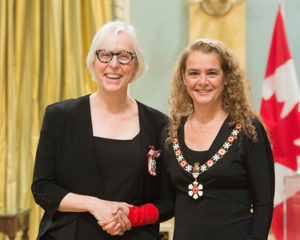
Now that most of the major parties have published their platforms, the OC team has spent some time with arts- and culture-specific commitments – and they are summarized below.
Bloc Québécois
Click here to view the platform (French only)
The Bloc Québécois platform includes a section about arts and culture, with a specific focus on protecting Quebec arts and culture.
The Bloc Québécois has pledged:
- To repatriate all arts and culture decision-making powers
- To create a Quebec agency to replace the CRTC
- To improve and reintroduce reform for the future of French-language creation, including the Bloc’s amendments which aim to protect Canadian and Quebec content and to strengthen the discoverability and promotion of Quebec arts and the production of francophone content
- To tax the revenues of digital giants at a rate of 3%, mirroring practices in place in France. The Bloc Québécois will force Web multinationals to negotiate with Quebec and Canadian content creators in order to establish fair revenue sharing
- To ensure the sustainability and predictability of cultural and tourism programs and subsidies to help the sector, its creators, its broadcasters and its small and large events to weather the consequences of the pandemic over the next few years
- To ensure that print and regional media are included in this reform
- To demand that the money collected in taxes from the digital giants be redirected to a fund dedicated to Quebec’s arts, culture and media.
Conservative Party of Canada
View the platform in English and in French
The Conservative Party of Canada’s arts and culture platform focuses on cultural industries; the word “arts” does not appear.
We thank the BC Alliance for Arts and Culture for their summary of the CPC platform.
The Conservatives have pledged:
- To create the “Canada Job Surge Plan”, which would pay up to 50 per cent of the salary of new employees for six months;
- Business loans of up to $200,000 for small businesses in the hospitality, retail and tourism sectors;
- To give Radio-Canada a separate and distinct legal and administrative structure to reflect its distinct mandate of promoting francophone language and culture;
- To create a new Canadian Heritage Preservation Fund to provide a total of $75 million in grants to municipal governments over the next five years for the repair and restoration of historical monuments, statues, and heritage buildings;
- To require large digital streaming services like Netflix, Disney+ and Amazon Prime Video to reinvest a significant portion of their Canadian gross revenue into producing original Canadian programming, of which a mandated proportion must be French-language programming;
- To recognize and correct the adverse economic impact for creators and publishers from the uncompensated use of their works in a manner consistent with the unanimous recommendations of the Heritage Committee of the House of Commons Report in 2019;
- To conduct a review of federal book publishing policy to enhance the commercial viability of Canada’s independent publishing sector.
Additionally, and of interest to registered charities: the CPC platform also includes a commitment to raise the disbursement quota for charitable foundations to 7.5% of their fair market value calculated over the preceding 24 months.
Green Party of Canada
The Green Party of Canada released its 2021 campaign platform recently.
View the platform in English and in French
The arts and culture component of the Green Party platform is comprehensive, and focuses on the role that artists and arts organizations can play in addressing the climate crisis, respect for Indigenous knowledge and practices, official language and minority language rights, access to the arts, and copyright reform.
If elected, the Green Party of Canada pledges to:
- Increase funding to all federal agencies including the Canada Council for the Arts, the National Film Board and Telefilm Canada to initiate programs to support creative programming that addresses the climate crisis
- Enable pandemic recovery (by increasing support for indoor or outdoor arts performances and ensuring the viability of cultural infrastructure)
- Increase funding to $1 billion over 3 years to all of Canada’s arts and culture organizations including the Canada Council for the Arts, Telefilm Canada, orchestras, theatres, galleries and publishers
- Establishing stable base funding for arts programs and facilities at a set percentage of the federal budget
- Protect Canada’s cultural identity during trade negotiations and ensure arts and cultural representation on international trade missions
- Enact Copyright reform as envisaged by the current Heritage Committee report, and provide protection for Indigenous intellectual and artistic property rights
- Reform the Canada Revenue Act to allow arts and culture workers to benefit from a tax averaging plan
Liberal Party of Canada
View the platform in English and in French
The Liberal Party of Canada platform includes sections relevant to arts and culture organizations, and cultural industries.
The Liberals have pledged:
- To launch a new Arts and Culture Recovery Program that will match ticket sales for performing arts, live theatres, and other cultural venues to compensate for reduced capacity.
- To extend COVID-related insurance coverage for media production stoppages to support 150,000 Canadian jobs.
- To Implement a COVID-19 transitional support program to provide emergency relief to out-of-work artists, craftsmen, creators, and authors who are primarily self-employed or independent contractors.
- To ensure the realities of artists and cultural workers are considered in upcoming reforms to the Employment Insurance (EI) system.
- To protect Canadian artists, creators, and copyright holders by making changes to the Copyright Act, including amending the Act to allow resale rights for artists.
- To hold a summit, within the first 100 days, on plans to restart the industry.
New Democratic Party of Canada
View the platform in English and in French
The NDP has pledged:
- A dedicated re-building package for the performing arts, theatre, festivals and other arts that have been most severely impacted by the pandemic.
- To ensure that Netflix, Facebook, Google and other digital media companies pay the same corporate taxes as Canadian broadcasters, support Canadian content in both official languages, and take responsibility for what appears on their platforms.
- To modernize the Broadcasting Act fairly in order to create a level playing field between Canadian broadcasters and foreign streaming services, to rebalance negotiating power for Canadian independent producers and the Canadian cultural sector, and to ensure Canadian programming is owned by Canadians.
- To prioritize partnerships with Canadian independent producers, increase funding for Telefilm and enhance financial support for the Canada Media Fund.
- To increase funding for CBC and Radio-Canada.
- To ensure stable, long-term funding to arts and cultural institutions.
- To extend support to Canadian media to assist them in making the digital transition.
- To provide financial support for Indigenous theatre at the National Arts Centre as part of a larger effort to honour and support Indigenous arts and culture.
We will update you with additional information when it becomes available.

 Katherine Carleton, Orchestras Canada’s executive director, has been appointed as a Member of the Order of Canada. A respected arts manager and an accomplished musician, she has been at the helm of Orchestras Canada since 2005. Before coming to Orchestras Canada, Ms. Carleton was executive director of the Kingston Symphony, the Nova Scotia Symphony and the Kitchener-Waterloo Symphony Orchestra. A passionate arts advocate, Katherine Carleton has garnered the respect of the orchestra industry across Canada and abroad.
Katherine Carleton, Orchestras Canada’s executive director, has been appointed as a Member of the Order of Canada. A respected arts manager and an accomplished musician, she has been at the helm of Orchestras Canada since 2005. Before coming to Orchestras Canada, Ms. Carleton was executive director of the Kingston Symphony, the Nova Scotia Symphony and the Kitchener-Waterloo Symphony Orchestra. A passionate arts advocate, Katherine Carleton has garnered the respect of the orchestra industry across Canada and abroad.